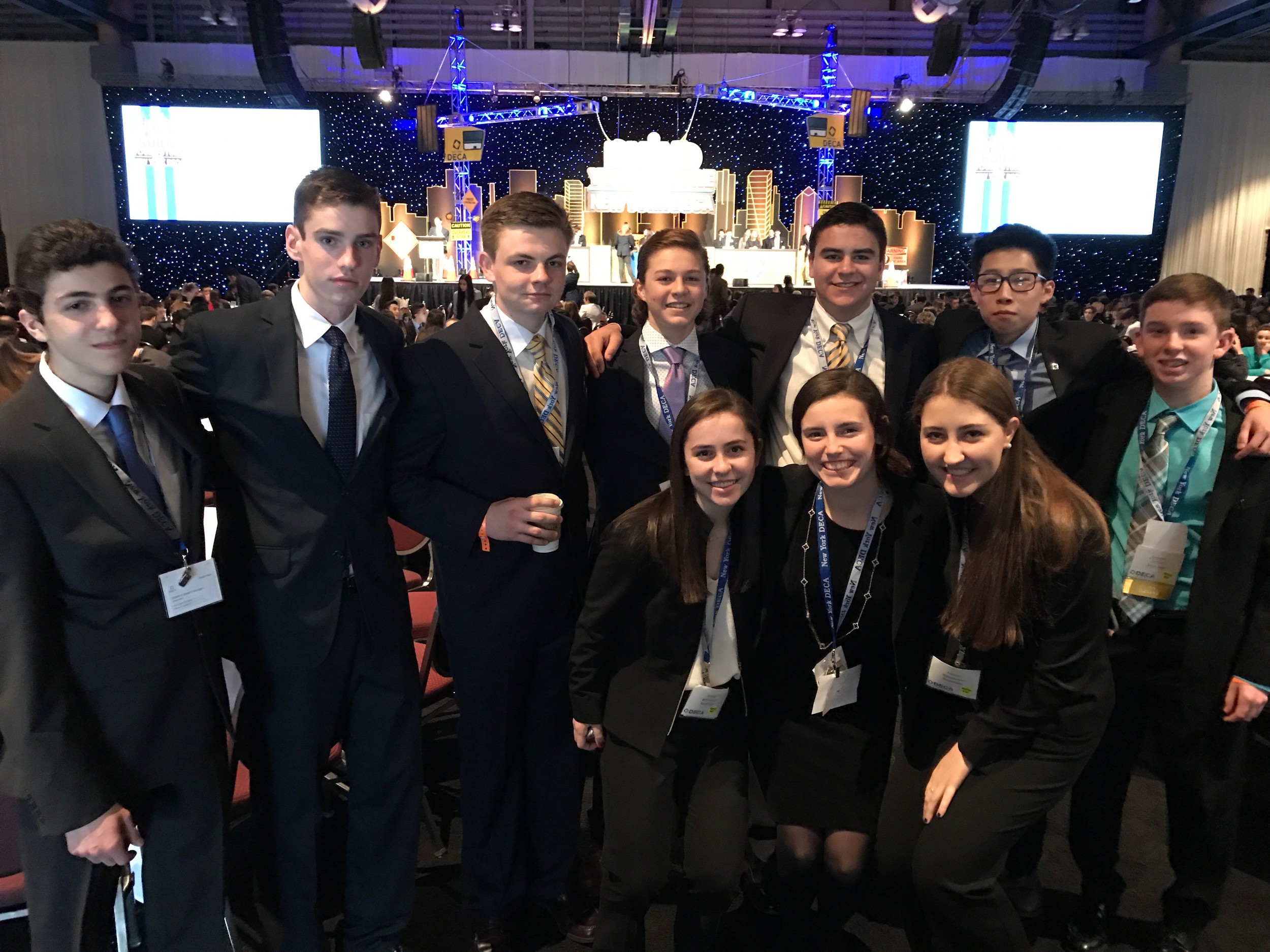RVC's SSHS grooms future business leaders with reborn club
South Side High School student Allyson Rosenbaum was worried about her future. As she entered her junior year, she was unsure about her career path, and said that many of the International Baccalaureate classes offered by the school this year were “not for me.”
Through a process of elimination, Rosenbaum chose the I.B. business and marketing classes taught by first-year South Side teacher Peter English. In both courses, English promoted his Distributive Education Clubs of America after-school club, which he ran at his former high school in New Jersey.
Rosenbaum, who admits to being shy, bought English’s pitch and joined the club. It turned out to be a life-changing decision.
“I’m not good at science and I can’t do music or art, so I took business as a last resort and I love it,” she said. “I definitely want to go into marketing now.”
Founded in 1946, DECA is a nonprofit organization that prepares students for careers in marketing, business management and administration, finance, and hospitality and tourism. It offers co-curricular programs that integrate into classroom instruction, connect with businesses and promote competition. Club members compete in business events at the regional, state and national levels and can earn scholarships.
DECA clubs can be found in both high schools and colleges. There are about 200,000 high school members in 3,500 schools worldwide, and 15,000 members in 275 colleges and universities. Schools in Canada, China, Colombia, Germany, Guam, Mexico and Puerto Rico also have chapters.
English has been involved with DECA for eight years, the first seven at Park Ridge High School in New Jersey, and learned that South Side ran the program years ago before it became dormant. He was hired to teach the school’s first I.B. business class, and thought it was the perfect time to revitalize the club.
“I just thought, What a better way to marry the curriculum to an extracurricular activity,” English said. “It gets the students really excited about business in general through the club. I knew it was on the books, so I thought, Let’s bring it back. It was something I was definitely interested in doing.”
Despite getting off to a late start in October, the club attracted about 60 members. English acknowledged that it took some prodding to reach that number, but students saw the worth of the club.
“You see a student come in on the first day of class or hearing DECA being mentioned, [they have their] head down and they don’t want anything to do with it,” he said. “They hear there’s a speaking component where they have to be in front of a judge, they’re nervous about it. But when I speak about it and I show them pictures on what can be done, once they get through that experience after their first competition, nine times out of 10 they come back and there’s a sense of, Wow, I can do this.”
The club meets for a half-hour to an hour once a week. English has taught the students role playing, public speaking techniques and business theories that can be applied to their presentations. The regional competition took place at Freeport High School in February.
Students can compete as individuals or in pairs. The regional winners advance to the state competition in Rochester in March, and the top competitors there move on to the International Career Development Conference in Anaheim, Calif., in April, where they go up against the top students from around the world.
At a typical competition, each student is given a written component, such as a 100-question exam, and makes a sales pitch to an industry professional who serves as a judge. Participants are given 30 minutes to turn a topic and accompanying notes into an oral presentation, and must reference assigned “buzzwords” while they speak.
At the regionals, Rosenbaum and partner Emma Becconsall, who competed in the Marketing and Management category, had to describe ethics for a cleaning business. They were among 10 South Side students to qualify for the state competition, but they just missed advancing to the nationals.
“It was rough and upsetting, but it’s both of our first years in business, so we were really proud of how far we came,” Rosenbaum said.
Finishing just ahead of them in Rochester, and qualifying for the competition in Anaheim, was fellow South Side junior Joseph MacNair, in the Apparel and Accessories Marketing category, who wowed the judge with his clothing line presentation. MacNair said that there were over 20,000 people at the Anaheim Convention Center, and he met students from as far away as South Korea.
“I told my parents, [and] they thought I was joking around,” he said. “It was crazy. It’s a great experience. It really prepared me for life.”
South Side’s DECA club was student-funded this year, and, since the 2017-18 budget is already set, will be next year as well. Club members, who pay a $40 fee to join, say they plan to attend future school board meetings in an effort to persuade administrators to help fund the program.
That strategy has worked in the past. This year, middle and high school robotics team members went before the board and asked the trustees to fund the up-and-coming program. The board responded by earmarking $20,000 for it in next year’s spending plan.
“That’s the idea I’m salivating over,” English said. “This is a real business problem that they’re going to have to figure out. That’s what DECA’s essence really is.”






